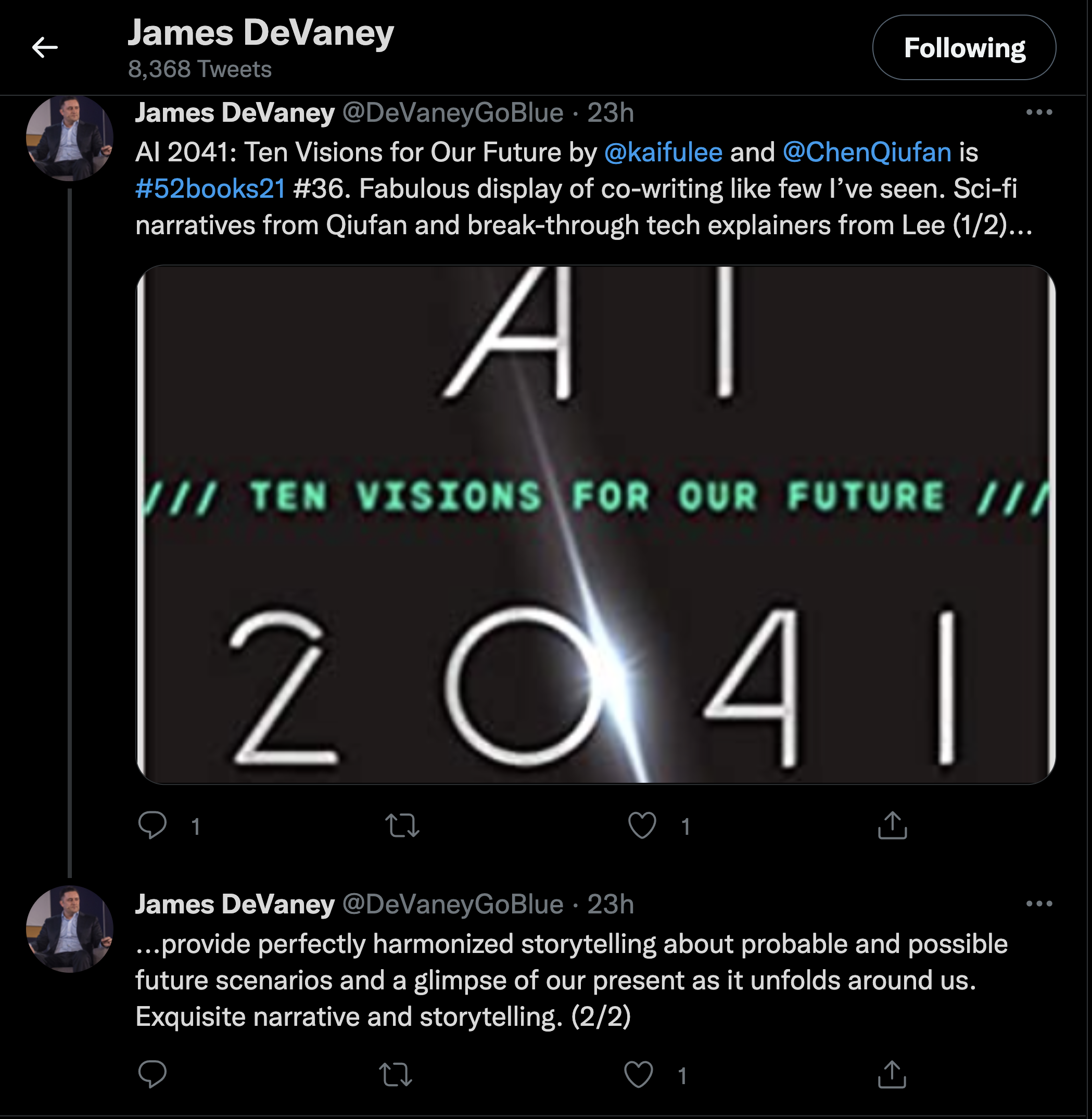You have /5 articles left.
Sign up for a free account or log in.
AI 2041: Ten Visions for Our Future by Kai-Fu Lee and Chen Qiufan
Published in September 2021
This weekend, as I was finishing AI 2041: Ten Visions for Our Future, the following tweets from my friend James DeVaney floated across my screen.

You might know James as the associate vice provost for academic innovation and founding executive director for the Center for Academic Innovation at the University of Michigan. Or perhaps as a writer and thinker who appears with some regularity on Inside Higher Ed. I know James as a reliable source of book recommendations.
I continue to wonder why recommendations from friends are so much more accurate and persuasive than those generated by AI? I’m much more likely to pursue a book endorsed by you than one surfaced by Amazon. If Amazon’s algorithms want me to spend my money on digital books (ebooks and audiobooks) sold on their platform, then the system should be pointing me to reviews by people in my extended network.
Reading has always been a social learning experience. How could platforms facilitate this more effectively in a digital age? Perhaps Amazon would see this benefit as a trade-off at odds with guiding optimal purchasing patterns. I would argue that facilitating trusted network connections and an improved reading journey would create tremendous value.
Maybe in 20 years, we will see better book recommendation AI. Alas, which books we choose to invest our time reading is not one of the topics covered in AI 2041. Despite that oversight, AI 2041 does seem almost perfectly designed to tempt a certain subset of readers with professional interests in technology and a passion for all things science fiction.
The format of AI 2041 is one that should be followed by more writing teams, and perhaps even by academics thinking about curricular innovation. James and I connected to compare notes about our respective reading experiences with AI 2041.
James was motivated by the simple formula (sci-fi narrative plus emerging tech explainer) and suggested that “this approach could and should inspire effective pedagogical choices and storytelling narrative techniques in MOOCs on emerging tech topics. It’s an elegant method for looking back from the future and quickly juxtaposing with a look forward from the present.”
AI 2041 combines a nonfiction analysis of the future of artificial intelligence (supplied by Lee) with 10 short world-building stories of life in 2041 (written by Chen). Different scenarios covered in the short stories include how two decades of technological evolution may impact education, entertainment, health care, employment, transportation, terrorism, wealth and poverty.
If you read Lee’s 2018 book AI Superpowers (see my review), you will know that he is more a champion than a skeptic of artificial intelligence. Lee has a long history as a technology executive and investor. It is no surprise, therefore, that AI 2041 paints a mostly positive picture of the impact of artificial intelligence.
While the futures that Lee and Chen conjure are by no means utopia. In one story the COVID pandemic never ends. None of the stories, however, describe a world of AI-enabled total state surveillance. The potential for artificial intelligence to be a tool of autocratic governments and monopolistic corporations is pretty much absent from AI 2041, an omission that many readers may find troubling.
The flip side of this criticism (not skeptical enough of AI) is that AI 2041 provides an engaging and even hopeful reading experience. Lee is convinced, and Chen brings to life in the stories, that AI will be an enabler of future material abundance.
In this vision of the future, the combination of smart manufacturing (AI-driven robots), autonomous supply chains (self-driving vehicles) and renewable energy will dramatically lower the cost of most material goods. The stories and analysis in AI 2041 do not shy away from considering the impact of technology on jobs. Lee and Chen are mostly optimistic that new technologies will create more jobs than they destroy, but they do allow that governments will need to develop new programs to deal with displaced workers.
More books should combine the talents of nonfiction and fiction writers. Should more college courses as well?
While reading AI 2041, I was imagining a class built around the integration of fiction and nonfiction readings. How often do CS classes include reading, and maybe even writing, science fiction stories? In how many English classes do students get hands-on experience with coding and robotics?
Circling back to James’s idea that this formula could be leveraged in MOOCs on emerging tech topics, he called out that “a well-considered course design would incorporate a more balanced approach to possible, probable and preferred futures that takes into account greater ethical dilemmas and possible adverse outcomes.”
I’d take a class on the future of higher education in a hot second, provided that it was built around science fiction and was taught by Bryan Alexander.
Can you recommend other books that integrate nonfiction analysis and engaging fiction stories?
How do you choose which books you plan to read next?
What are you reading?




